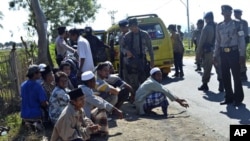An investigation into a bomb explosion last week at an Islamic boarding school in eastern Indonesia sparked a two-day standoff between police and armed students.
School explosion, investigation
Dozens of students armed with knives and machetes prevented police from entering their Islamic boarding school, Umar bin Khatab, to investigate an explosion there on July 12. The blast killed the school’s treasurer, who was allegedly training students how to make homemade bombs.
When the two-day standoff in Sumbawa Island finally ended police found several weapons, including arrows and machetes and potential bomb-making materials. They also discovered literature advocating the armed struggle for Islamic, or Sharia, law.
Although the school was suspected of religious extremism and had clear links to hard-line Islamic groups, analysts say the government did not investigate it earlier because there was no proof of criminal activity. They say going after Islamic boarding schools, or pesantren, merely on suspicion could antagonize the Muslim mainstream.
Sidney Jones, a senior advisor at the International Crisis Group, which researches militancy in Indonesia, says the two-day standoff at Umar bin Khatab is a sign of how authorities are increasingly mindful about how the public views operations against Islamic militants.
“The police have faced a lot of criticism over the past year for being too quick to shoot. And I think they were probably genuinely interested in avoiding a confrontation where they might be accused of using undue force against students,” Jones said.
Police's response to bomb
The day after the bomb blast at the school, police deployed officers from the local mobile police brigade to control the situation. Although police briefly clashed with residents protesting the police presence, they refused to use force to enter the school.
While police were waiting to go in, the school’s leader, Abrori, fled the scene undetected along with students. When police finally entered they found the building empty but they have since arrested eight suspects, including Abrori.
Terrorism concerns
Analysts say Umar bin Khatab has long-standing ties with radical Islamists and has been linked to Jemaah Ansharut Tauhid. That hard-line group was founded in 2008 by radical preacher Abu Bakar Bashir, who was sentenced last month to 15 years in prison for helping organize a terrorist training camp in Aceh province.
Abrori allegedly had ties to the other main figure in the Aceh case, a man known as Ubaid. He testified that some of the money for the training camp in Aceh came from Umar bin Khatab. Jones also suspects that the brother-in-law of Dulmatin, the head of the camp who was killed by police last year, trained students during his brief stay at the Umar bin Khatab pesantran in June 2009.
“This is a school which has been intertwined in the radical networks since it was founded basically … it should have been on the radar screen from 2004,” Jones stated.
Religious Affairs Minister Suryadharman Ali told local media that the school had long been a cause of concern because of fears that students there had connections with radical groups.
Political analyst Yohanes Sulaiman attributes the authorities' apparent reluctance to pursue radical groups to the fact that public support for fundamentalism is declining.
He says the school in Sumbawa is part of an old cell of militants who are trying to promote themselves at a time when they are losing their support base. He says police would rather ignore the group than confront it.
"Terrorism is declining, radicalism is actually declining. And if you look at Sumbawa, it's basically an old cell trying to rejuvenate itself. So what you have here is a kind of benign neglect from authorities," Sulaiman said.
Sulaiman says Sumbawa is basically an old cell that is trying to rejuvenate itself so authorities have been ignoring it on purpose.
Jones, however, says the school's activities are not inconsequential. She says all schools suspected of radical activity should be put under surveillance and government officials should take stronger measures to go after those suspected of criminal activity. “It’s moving from knowing that extremist teachings are taking place to figuring out how to address that problem when there is no crime, because there is only police attention in a serious way after some act of violence has been committed, or in some cases after fundraising has taken place,” she noted.
Past terrorist activities in Indonesia
Indonesia is a secular democracy whose majority Muslim population is known for observing a moderate form of Islam. The bombing of a nightclub in Bali in 2002 drew attention to terrorist groups like Jemaah Islamiyah, al-Qaeda’s Southeast Asian affiliate. But a counter-terrorism police dragnet that has seen around 600 suspected militants killed or captured since then has degraded its influence.
With many top-level JI leaders in jail, the group has shifted toward non-violence as a recruitment tactic. Meanwhile, small cells not linked to JI have begun targeting police and groups deemed un-Islamic.
Jones says arrests of figures such as Bashir and Ubaid may help focus fundamentalists hatred of the police and a combination of ideology and personal revenge is driving recent acts of violence and militancy.
Last month, a student at Umar bin Khatab was arrested for fatally stabbing a police officer in the neck. Local media reported that the student told police he attacked the man because he enforced rules that went against Islam.




